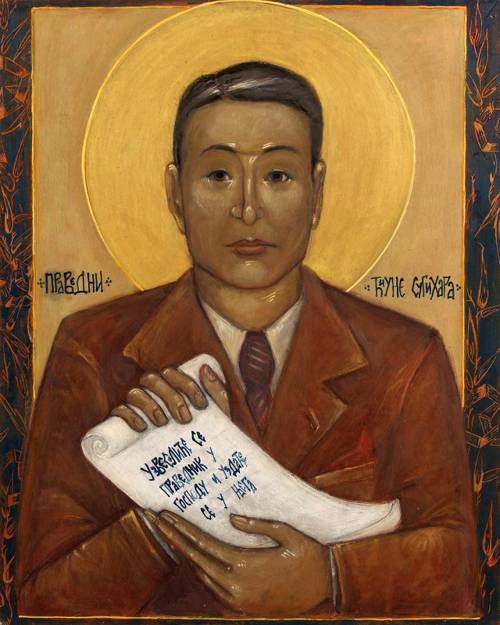
FAQ About Chiune Sugihara

Who was Chiune Sugihara?
Chiune Sugihara was a Japanese diplomat who served as Vice-Consul for the Japanese Empire in Lithuania during World War II. He is renowned for his humanitarian efforts, especially his role in saving thousands of Jewish refugees by issuing transit visas, enabling them to escape Europe.

What did Chiune Sugihara do to help Jewish refugees?
Chiune Sugihara issued thousands of transit visas to Jewish refugees, against the advice of the Japanese government. This act allowed many Jews to escape Nazi-occupied territories via Japan, potentially saving thousands of lives from the Holocaust.

How many visas did Chiune Sugihara issue?
Sugihara issued approximately 2,100 visas, but since these were often family visas, it is estimated that his actions contributed to the saving of over 6,000 Jewish lives.

Why is Chiune Sugihara sometimes compared to Oskar Schindler?
Both Chiune Sugihara and Oskar Schindler are celebrated for their courageous actions during WWII, where they went against their governments' policies to save Jews from the Holocaust. Sugihara used visas, whereas Schindler protected Jews by employing them in his factories.

What were the consequences of Sugihara's actions for his career?
Chiune Sugihara's actions led to his dismissal from the Japanese diplomatic service. After the end of World War II, he was forced to resign, allegedly due to downsizing, but many believe it was because of the visas he issued without government consent.

How is Chiune Sugihara remembered today?
Sugihara is remembered as a humanitarian hero. He has been recognized posthumously with various honors, such as the Righteous Among the Nations title by Yad Vashem in Israel. Numerous memorials and institutions are dedicated to him, reflecting his courageous actions during the war.

What motivated Chiune Sugihara to issue the visas?
Sugihara was driven by a strong sense of duty and compassion. Witnessing the plight of Jewish refugees pleading for visas deeply moved him. Despite knowing the professional risks, he believed it was morally imperative to help save human lives.

Where can one find memorials dedicated to Chiune Sugihara?
There are several memorials dedicated to Sugihara worldwide, including the Sugihara House in Kaunas, Lithuania, which serves as a museum. His contributions are also recognized in Japan and Israel, among other places.

Did Chiune Sugihara act alone in his efforts?
While Sugihara is chiefly credited with issuing the life-saving visas, he was supported by his wife, Yukiko, who assisted him in issuing and processing the documents. Additionally, his dedication inspired some local staff and officials to aid the refugees.

Was Chiune Sugihara recognized during his lifetime for his actions?
The full extent of Sugihara's actions was not widely recognized during his lifetime. It wasn't until much later, particularly after the liberation of Israel, that his deeds became more publicly acknowledged and celebrated.

What was Chiune Sugihara's early life and background?
Chiune Sugihara was born on January 1, 1900, in Yaotsu, Gifu Prefecture, Japan. He was a diligent student, demonstrating an early aptitude for languages and international affairs, which eventually led him to pursue a career in diplomacy.

How did Chiune Sugihara's upbringing influence his decision-making during WWII?
Sugihara was raised with strong values of education, hard work, and compassion. His Christian faith and the teachings of his altruistic parents influenced his moral compass, leading him to prioritize humanitarian needs over official orders during the war.

Is there any literature or films about Chiune Sugihara?
Yes, Chiune Sugihara's story has been depicted in various books, documentaries, and films. Notable works include the book "Sugihara: Conspiracy of Kindness" and the film "Persona Non Grata," dramatizing his life and heroic deeds.

What happened to the people who received visas from Sugihara?
Many of the refugees who received Sugihara's visas managed to escape to safety in places such as Japan and later to other countries. They avoided the devastating fate that awaited many others who were caught in Nazi-occupied territories.

How did Chiune Sugihara's wife contribute to his efforts?
Yukiko Sugihara played a significant role in aiding her husband. She helped by writing in hand-written visa details, calming the refugees, and supporting his moral decision to issue the visas despite knowing the risks involved.

Have any honors been posthumously awarded to Chiune Sugihara?
Yes, Chiune Sugihara has received numerous posthumous honors, including being named Righteous Among the Nations by Yad Vashem in 1985, a prestigious recognition for non-Jews who risked their lives to save Jews during the Holocaust.

What role did Chiune Sugihara play after WWII?
After WWII, Chiune Sugihara faced difficulties in finding work, largely due to his diplomatic dismissal. He eventually took various jobs, including trading in Russia, translating, and working for a Japanese company, leading a relatively quiet life until his deeds were more widely recognized.

How is Chiune Sugihara's legacy viewed in Japan?
Chiune Sugihara's legacy has become increasingly honored in Japan. Initially met with muted acknowledgment due to geopolitical circumstances, his bravery is now celebrated, with numerous events, literature, and educational programs dedicated to teaching about his humanitarian efforts.

What challenges did Chiune Sugihara face while issuing the visas?
Sugihara faced significant challenges, including bureaucratic opposition from Tokyo, personal risk to his career, limited time, overwhelming demand from refugees, and the constant presence of Soviet pressure, as they had occupied Lithuania by June 1940.

How did Chiune Sugihara's actions impact global diplomatic protocols during WWII?
Sugihara's actions have been cited as a landmark in humanitarian diplomacy. His courage in prioritizing human lives over strict adherence to government policies showcased the potential impact of individual decisions in diplomatic protocols, inspiring future generations of diplomats to act with humanity and moral conviction.
